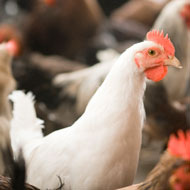
New genes identified that are linked to ocular coloboma
A study of chicken embryos has identified new genes that could be responsible for the development of ocular coloboma in humans.
Ocular coloboma causes part of the eye to be missing at birth, severely affecting the patient’s vision. It accounts for up to 10 per cent of all childhood blindness and cannot be treated.
The disease is the result of errors in tissue fusion, which is essential for the formation of the eye and many other organs of the developing embryo.
Scientists at the Roslin Institute studied chicken embryos to determine how fusion occurs and identified genes that are switched on or off during the process.
One of the many newly identified genes included Netrin-1, which scientists say is likely to be critical in humans and other species, as well as in organs other than the eye.
Lead author Dr Joe Rainger said: “Identifying new genes and processes involved in tissue fusion will improve our understanding of how fusion defects occur, and whether these may be preventable.
"The fusion-genes we have revealed are also an excellent resource to support the identification of genetic defects in patient sequencing programmes.”



 RCVS Knowledge has welcomed Professor Peter Cockcroft as editor-in-chief for Veterinary Evidence.
RCVS Knowledge has welcomed Professor Peter Cockcroft as editor-in-chief for Veterinary Evidence.